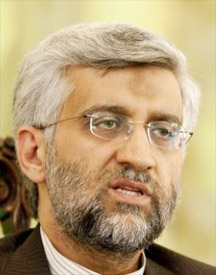BRUSSELS, (Reuters) – World powers will insist on Iran curbing its production of high-grade uranium at the next round of nuclear talks in Moscow, a senior European Union negotiator told her counterpart in Tehran yesterday.

In a letter to Tehran, the European Union’s Helga Schmid said an offer by the six powers trying to resolve a standoff with Iran over its nuclear work, proposed at talks in Baghdad in May, was still on the table.
The six countries – the United States, China, Russia, Germany, France and Britain – have asked Tehran to stop enriching uranium to 20 percent to address their concerns that the Iranian nuclear work aims to produce weapons.
But Schmid said more talks on the details of the proposal were needed.
“We would feel very encouraged if Iran were ready … to enter into these discussions,” she wrote in a letter, seen by Reuters, to Iran’s deputy negotiator Ali Bagheri. EU diplomats negotiate with Iran on behalf of the six powers.
“It remains the collective conviction of the (six powers) that this proposal continues to represent the most promising basis for moving our discussions towards achieving concrete results at an early stage,” she said.
Iran accused the world powers this week of reluctance to hold preparatory talks ahead of the Moscow round of negotiations, and said their attitude had thrown doubt on the next meeting, scheduled for June 18 and 19.
But Schmid said in her letter she was “somewhat surprised” by Tehran’s allegations.The world powers, she said, had expressed readiness to hold in-depth discussions over their proposal, which included a call on Tehran to close an underground enrichment facility and ship out its stockpile of high-grade uranium.
‘SUBSTANCE OF
THE PROPOSAL’
Iran’s ability to enrich uranium to 20 percent represents a major technological advance on route to building nuclear weapons.
“Unfortunately, in Baghdad Iran was not prepared to take up our suggestion to enter into discussions on the substance of the proposal,” she wrote.
Iranian media reported that Iran’s chief negotiator Saeed Jalili has written twice to EU foreign policy chief Catherine Ashton, his counterpart, seeking preparatory meetings. Schmid is the senior official in Ashton’s negotiating team. Yesterday, Iranian president Mahmoud Ahmadinejad again accused the six powers of hampering talks.
“The Iranian nation is committed to talks and negotiations but the arrogant powers are not interested in resolving Iran’s nuclear case,” he was quoted as saying by official IRNA news agency during a meeting with Afghan President Hamid Karzai in Beijing.
In Washington, a senior administration official said the big powers were “ready and willing” to have preparatory discussions with Iran before the Moscow meeting as long as they focused on substantive issues.
“Our interest is in producing concrete action that addresses the international community’s concerns about Iran nuclear program and we stand ready to engage if Iran is indeed willing,” the official said, speaking on condition of anonymity.
Schmid, too, said she needed assurances from Tehran that any discussions would focus on the six powers’ core concerns.
“Now there is a need to engage seriously on the issues of substance in order to agree on concrete confidence building steps which could be implemented swiftly,” she said.
In the course of the 10-year standoff over Iran’s nuclear work, which Tehran says aims to produce electricity and isotopes for cancer patients, Iranian negotiators have often refused to discuss atom work or sought to side-step the issue during talks.
Negotiations resumed in April after a 15-month hiatus, with Iran facing intensifying economic sanctions from the United States and EU member states.
